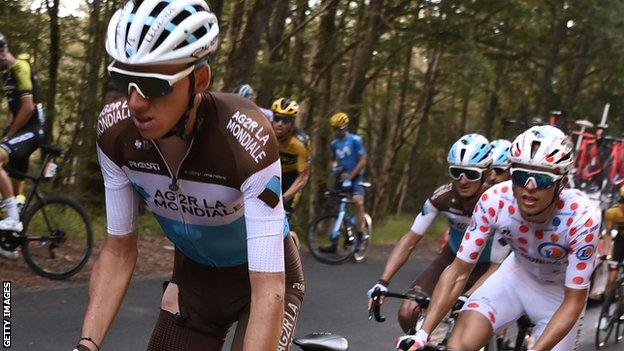
Cycling’s governing body the UCI has set out new rules to identify concussion among riders.
These include the training of non-health professionals such as sporting directors, mechanics and fellow riders, often first on the scene of a crash.
The measures come as the issue of brain injuries across sport has been raised by cases in football and rugby.
“Sports-related concussion [SRC] was one of my priorities,” said UCI medical director professor Xavier Bigard.
“Cycling now has guidelines that set out the various phases involved in dealing with SRC – initial assessment, diagnosis, recovery, and return to competition.
“This protocol applies to all disciplines [of cycling], while taking their specific characteristics into consideration,” he added.
“It will make it easier to trace individual SRC cases and better understand their place in cycling traumatology.”
The news follows Tuesday’s announcement that Rugby World Cup winner Steve Thompson and seven other former players are in the process of starting a claim against the game’s authorities for negligence that led to them sustaining brain damage.
There have also been calls for football to make changes over the issue of concussion.
The new “protocol specific to cycling” has been introduced following work conducted in 2019 by doctors, scientists and neurologists under the supervision of the UCI.
The protocol recommends “non-health professionals (in particular coaches, sport directors, mechanics and riders) be trained for recognising the signs of suspected SRC since they are very often the first people on the scene after a rider falls”.
The guidelines say those trained should look out for an athlete “feeling stunned or dazed, trouble with balance, headaches, slurred speech, changes in vision”.
The protocol also sets out recommendations for a rider’s return to competition, with complete rest for between 24 and 48 hours and “no return to competition for at least a week after their symptoms have cleared up”.
There will also be compulsory recording of each concussion, given the dangers of multiple concussions.
Cycling hard to manage
There have been questions about how the sport deals with head injuries and potential concussions in the wake of serious incidents in all three grand tours this summer.
AG2R La Mondiale’s Romain Bardet was allowed to finish stage 13 of the Tour de France despite suffering a brain haemorrhage after a crash, in which he collapsed trying to get back to his feet.
Trek-Segafredo’s Dutch rider Pieter Weening abandoned the Giro d’Italia with suspected concussion after he struck a discarded drinks bottle on stage four and hit his head on the road, but completed the stage.
Weening was clearly confused but after being assessed was allowed to continue, before abandoning a day later.
A similar incident occurred during this year’s Vuelta a Espana, when Caja Rural rider Hector Saez’s head struck the ground hard enough to break a large chunk off his helmet – he also completed the stage before pulling out the race.
The UCI’s previous ‘concussion and return to competition’ guidelines advised: “Any rider with a suspected concussion should be immediately removed from the competition or training and urgently assessed medically.”
The biggest challenge for cycling, compared to other sports, is that races on public roads cannot be stopped to assess one rider’s health.
Quick decisions are often made without consultation so the rider can catch back up to the peloton.
Jonathan Vaughters, team boss of EF Pro Cycling, for whom Britain’s Hugh Carthy rides, said during the Giro: “These crashes always happened in the past and there were concussions all the time – we just got back up on our bikes and couldn’t remember what day we were born, but raced anyway.
“That’s not very intelligent and society has evolved and media coverage has evolved so we are more aware of these accidents.
“There needs to be changes but it’s very difficult – if a rider hits the road, they may or may not be concussed. If you sit them down and do a full analysis they have to quit the race because they never catch up to the peloton.
“We have to be creative about new rules – there’s no simple answer. You can’t just call a time-out. Cycling doesn’t work that way.”